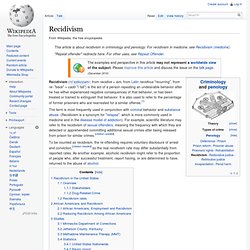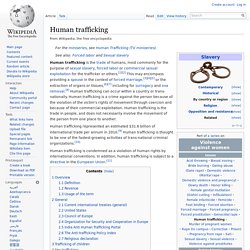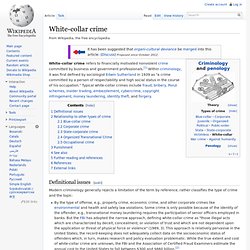

Www.loksatta.org/cms/documents/indianpolicesystem_summary.pdf. Punishment. If only some of the conditions included in the definition of punishment are present, descriptions other than "punishment" may be considered more accurate.

Inflicting something negative, or unpleasant, on a person or animal, without authority is considered either spite or revenge rather than punishment.[4] In addition, the word "punishment" is used as a metaphor, as when a boxer experiences "punishment" during a fight. In other situations, breaking a rule may be rewarded, and so receiving such a reward naturally does not constitute punishment. Finally the condition of breaking (or breaching) the rules must be satisfied for consequences to be considered punishment.[4] Definitions[edit] A modern jail cell. Hester Prynne at the Stocks - an engraved illustration from an 1878 edition of The Scarlet Letter.
Theories of Punishments - LawNotes.in. Recidivism. Recidivism (/rɨˈsɪdɨvɪzəm/; from recidive + ism, from Latin recidīvus "recurring", from re- "back" + cadō "I fall") is the act of a person repeating an undesirable behavior after he has either experienced negative consequences of that behavior, or has been treated or trained to extinguish that behavior.

It is also used to refer to the percentage of former prisoners who are rearrested for a similar offense.[1] The term is most frequently used in conjunction with criminal behavior and substance abuse. (Recidivism is a synonym for "relapse", which is more commonly used in medicine and in the disease model of addiction). For example, scientific literature may refer to the recidivism of sexual offenders, meaning the frequency with which they are detected or apprehended committing additional sexual crimes after being released from prison for similar crimes.
[citation needed] Recidivism in the United States[edit] Recidivism rates in the U.S. Overview[edit] While the U.S. Human trafficking. Human trafficking is the trade of humans, most commonly for the purpose of sexual slavery, forced labor or commercial sexual exploitation for the trafficker or others.[1][2] This may encompass providing a spouse in the context of forced marriage,[3][4][5] or the extraction of organs or tissues,[6][7] including for surrogacy and ova removal.[8] Human trafficking can occur within a country or trans-nationally.

Human trafficking is a crime against the person because of the violation of the victim's rights of movement through coercion and because of their commercial exploitation. Human trafficking is the trade in people, and does not necessarily involve the movement of the person from one place to another. Human trafficking represented an estimated $31.6 billion of international trade per annum in 2010.[9] Human trafficking is thought to be one of the fastest-growing activities of trans-national criminal organizations.[10] Overview[edit] Definition[edit] Lawcommissionofindia.nic.in/1-50/Report47.pdf. White-collar crime. White-collar crime refers to financially motivated nonviolent crime committed by business and government professionals.[1] Within criminology, it was first defined by sociologist Edwin Sutherland in 1939 as "a crime committed by a person of respectability and high social status in the course of his occupation.

" Typical white-collar crimes include fraud, bribery, Ponzi schemes, insider trading, embezzlement, cybercrime, copyright infringement, money laundering, identity theft, and forgery. Definitional issues[edit] Modern criminology generally rejects a limitation of the term by reference, rather classifies the type of crime and the topic: Organized crime. 20th century American mobster Al Capone, a figure often associated with the topic of organized crime.
Other organizations—including states, militaries, police forces, and corporations—may sometimes use organized crime methods to conduct their business, but their powers derive from their status as formal social institutions. There is a tendency to distinguish organized crime from other forms of crimes, such as, white-collar crime, financial crimes, political crimes, war crime, state crimes and treason. This distinction is not always apparent and the academic debate is ongoing.[3] For example, in failed states that can no longer perform basic functions such as education, security, or governance, usually due to fractious violence or extreme poverty, organised crime, governance and war are often complementary to each other. Theories of crime causation. Theories of crime causation.